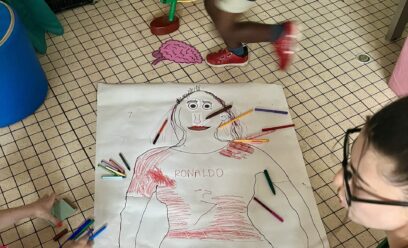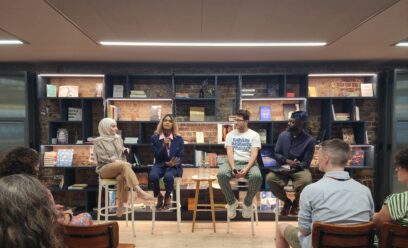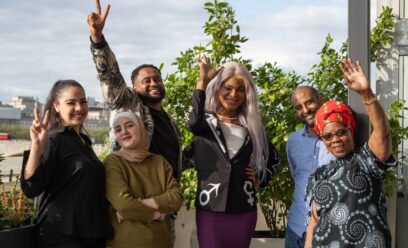Insights from IMIX’s Lived Experience Network
Posted by Jenni Regan on March 14, 2024At Imix, we recently brought together a diverse group of individuals, including refugees and asylum seekers, from our lived experience network. Our goal was to have an open and honest discussion about our past work, brainstorm ideas for improving our support systems, and plan for the future.
Our chat was filled with so much positivity and shared experiences. One thing that stood out was how everyone felt that Imix’s initiatives had truly changed lives. From confidence building and training to media engagement, our members shared how Imix has been a game-changer at every step of their journey. For the Imix team seeing the connections and friendships already formed through much of the group through projects such as our ambassador programme was very special, as well as hearing some of the incredible activities our group were doing, built on the work they had completed through Imix.
One member, Paval, shared his experience of being inspired to speak to the media as an asylum seeker, highlighting the importance of sharing experiences and perspectives with the public. He recommended Imix’s training programs to others, noting their effectiveness in preparing individuals to engage with various media platforms. ‘As asylum seekers, probably for most of us, you live in sort of vacuum. Not so many people are interested in your life, and you have not so many opportunities to share your experience, thoughts, stories, point of view, whatever it is.’
Another member, Shamim, emphasised the significance of training groups who may not have previous opportunities to develop their skills, enabling them to better advocate for themselves and others. Shamim added, ‘The training you offer is something compelling and unique that none of the other organisations provide in terms of your work.’
Nihola reflected on her involvement in multiple projects with Imix, gaining valuable skills in storytelling, video editing, and media engagement. She credited Imix with empowering her to speak confidently with the media and participate in TV, radio, and documentary opportunities.
Gaida highlighted the importance of sharing personal stories and experiences, particularly for refugees and asylum seekers often misunderstood by society. She underscored Imix’s role in providing a platform for refugees to share their stories and called for greater recognition of Imix’s impactful work. ‘Imix is a unique program that helps refugees to share their stories and messages. Many people don’t understand who refugees and asylum seekers are, so we are often seen as outsiders. We want to remind everyone that we are just humans who have found ourselves in difficult situations.’
Ghani also acknowledged the negative public perception towards asylum seekers and refugees and proposed ideas to shift the focus towards highlighting success stories using social media and media campaigns to advocate for fair treatment and policy changes.
Zahra hopes to see the ambassador programme continue to grow. ‘Being an ambassador helpedd me connect with other people and form strong bonds with other ambassadors. I want to to say thanks for the work you do and ask for bigger chances and platforms for Imix to continue growing.’ She highlighted her experience collaborating on podcasts and media campaigns to amplify the voices of Afghan women and refugees. Zahra also advocated engaging with policymakers to bring about significant change and challenge negative stereotypes associated with refugees.
Khaleel who has spoken regularly to the media about his experience of crossing the channel believes that by reaching a wider audience through Imix, refugees can increase the chances of people hearing and sharing their experiences. ‘Personally, since arriving four years ago, my circle is small. But by reaching a wider audience, we can increase the chances of people hearing and sharing their experiences.’
Ali commended Imix’s inclusive approach to sharing stories of individuals, including those who may not have directly benefited from their support. He praised Imix’s efforts in providing opportunities for people with lived experiences to speak to the media and collaborate on projects, fostering a sense of empowerment and respect for diverse voices. ‘In my experience working with Imix, I’ve had the chance to run workshops and collaborate on various projects.’
Joel commended Imix’s ethos and values and proposed ideas further to enhance its impact as a movement for change. They shared their positive experience working with Imix on a recent project that gained significant media attention. Joel encouraged collaboration with individuals to create projects that amplify voices and create a broader impact.
Implementing suggestions from the Network
One of the suggestions we received was to further develop our training programmes that focus on media engagement, storytelling, and public speaking. These programmes could include workshops, one-on-one mentorship sessions, and practical exercises to help participants build confidence and skills in sharing their stories effectively.
Another suggestion was collaborating with other organisations to create training programmes and resources catering to diverse interests and skills. This collaboration could enhance the reach and impact of the training initiatives and provide participants with a broader range of opportunities for personal and professional development.
Peer-to-peer mentoring was also flagged as a way for individuals to receive personalised support from media, writing, or creative arts professionals. This programme could involve collaborative projects between mentors and mentees, culminating in creating and publishing content on various platforms.
Social media content creation workshops were suggested to help participants develop skills in content creation. These sessions could provide practical skills in content creation, including scriptwriting, video editing, and leveraging social media algorithms to maximise impact.
Annual events and campaigns were also suggested to help refugees and asylum seekers amplify their voices and raise awareness about their experiences. Suggestions included developing a yearly planner highlighting essential events and awareness campaigns, such as International Women’s Day, Refugee Week, and LGBT Month, and actively participating in these events.
Another suggestion was to utilise AI technology to create short guides in different languages, providing practical advice and information to newly arrived refugees and asylum seekers. These guides could cover topics such as accessing healthcare, dealing with emergencies, navigating life in a new country, helping to address common challenges and promoting integration. This idea was also raised to encourage newly arrived asylum seekers to include their voices in the conversation by providing social media content that could help someone keen to speak or campaign through traditional or social media.
Finally, supplementing media campaigns with in-person outreach activities, such as school visits, community events, and panel discussions, was suggested. This approach allows for direct engagement with the community, helping to dispel negative stereotypes and build empathy and understanding.
Thankfully many of the suggestions are things we are already delivering or in our planning pipeline but we learned a lot about the importance of communicating our plans with this group. Overall, these suggestions from our network highlight the importance of providing refugees and asylum seekers with the tools and resources to share their stories effectively. By bringing these insights and ideas into our work, we hope to better reflect our community’s needs from Imix.




